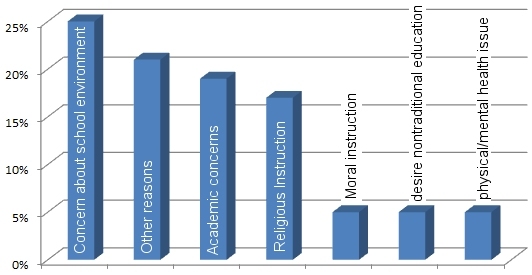The Latest Numbers on Homeschooling From The U.S. Department of Education
Homeschooled students building a trebuchet
(click for credit)
Since each state has its own laws regarding home education, it is very difficult for the federal government to track homeschooling families. As a result, the estimates regarding the number of homeschooled students is probably low and the sample that was studied is probably not totally representative of the homeschooling population. Also, the detailed statistics are based on a survey called the “Parent and Family Involvement in Education Survey.” Of the more than 17,000 students covered in that survey, only 397 were homeschooled. Thus, the statistics are based on a relatively small sample of students. Nevertheless, some of the results are worth noting.
First, the report tries to adjust its results to take into account the fact that it can’t track all homeschooling families. Based on the data and the subsequent adjustments, the report estimates that there were 1,773,000 students being homeschooled in 2012. This did not include students who were being temporarily homeschooled (because of a long-term illness, for example). This translates to roughly 3.4% of the population, which represents a doubling of the percentage of homeschooled students in 1999 and an 18% increase from the time of the previous report (2007). Needless to say, then, homeschooling is becoming more common.
Before I give you the next interesting statistic, I want you to think about the answer to the following question:
Are homeschooling parents generally more or less educated than the rest of the population?
I have heard people suggest both answers to that question. Some view homeschoolers as people who do not value “real” education, so they are less educated, on average, than the rest of the population. Others view homeschoolers as those who value education more than the rest of the population, so they are more educated. Based on this survey, the education level of homeschooling parents is roughly equivalent to that of the rest of the population. 25% of homeschooling parents have a Bachelor’s degree, while according to the U.S. Census Bureau, 32% of U.S. adults have one. 18% of homeschooling parents have a graduate or professional degree, compared to 12% of U.S. adults. Only about 2% of homeschooling parents don’t have at least a high school degree, compared to about 12% of U.S. adults.
I now want to present the most interesting of all the statistics, but before I do, I want you to once again answer the following question:
What is the most important reason homeschooling parents choose to homeschool their children?
I have asked this question to many friends who homeschool and many friends who do not. By far, most of my friends think that homeschooling parents choose to homeschool primarily for religious reasons. However, that’s not what this survey indicates. The survey asked homeschooling parents for all the reasons they homeschool, and then for the main reason they homeschool. There were several suggestions given, and the parents could also give their own reason. The following graph gives the results for the parents’ most important reason for homeschooling:

As you can see, religious instruction comes in fourth, behind concerns about the school environment, other reasons, and concerns that schools don’t provide adequate academic instruction. That is definitely not what I (or most of my friends) would have predicted! As a side note, you might be interested in what the parents meant by “other reasons.” According to the report, most of those reasons were specific to the particular family, such as travel, finances, and distance to a school.
Homeschooling has definitely changed over the years. As it has become a more common choice among parents, the reasons for making that choice and the type of parents who homeschool have changed. As time goes on, I expect homeschooling to continue to grow as a percentage of the population. As a result, I expect the homeschooling community to become even more diverse in their views and their reasons for homeschooling.
Jay L. Wile's Blog
- Jay L. Wile's profile
- 31 followers




